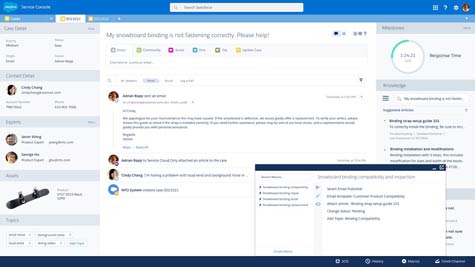As part of an effort to extend the integration reach of its cloud application portfolio via JavaScript, Salesforce today announced that Salesforce Service Cloud now supports the Salesforce Lightning component application development framework.
At the same time, Salesforce introduced Service Wave Analytics, an implementation of its cloud analytics software that is now tightly integrated with Salesforce Service Cloud.
Robert Amezaga, senior director of product marketing for Salesforce Service Cloud, says the goal is to make the customer service environment more easily extensible than it is today. For example, organizations should be able to click on an e-commerce module that can then be integrated with Salesforce Service Cloud at the click of a button. This is a critical capability because the primary way most organizations engage with existing customers is via their customer service desk, which many now regularly rely on to upsell additional products and services.
Since launching the Salesforce1 Lightning Components and App Builder framework earlier this year, Salesforce has been steadily applying the framework to all its applications starting with the newly redesigned Salesforce Lightning customer relationship management (CRM) software the company was founded around.
As an early pioneer of the SaaS application movement, Salesforce is now differentiating itself based on the user experience that organizations can achieve across a broad array of cloud applications that share access to same underlying records via a common database. The degree to which Salesforce can leverage those capabilities to expand its reach beyond CRM in the enterprise, though, remains to be seen.
But Salesforce reports that the annual run rate for Salesforce Service Cloud is now $1.7 billion, which Amezaga says represents a 40 percent year-over-year growth rate. Driving much of that demand, says Amezaga, is the fact that more organizations are looking for customer service applications that are not only easier to set up and maintain in the cloud, but also better able to support mobile applications. With these new capabilities, the Salesforce Service Cloud appears to be gaining traction in the CRM market.




